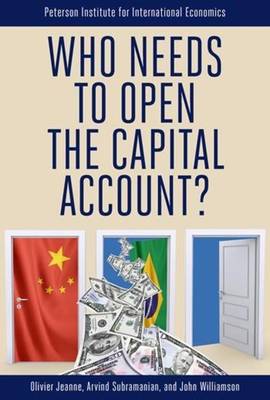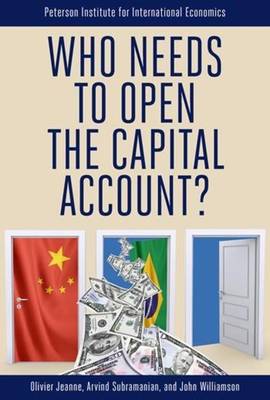
- Afhalen na 1 uur in een winkel met voorraad
- Gratis thuislevering in België vanaf € 30
- Ruim aanbod met 7 miljoen producten
- Afhalen na 1 uur in een winkel met voorraad
- Gratis thuislevering in België vanaf € 30
- Ruim aanbod met 7 miljoen producten
Zoeken
Who Needs to Open the Capital Account?
Olivier Jeanne, Arvind Subramanian, John Williamson
Paperback | Engels
€ 44,45
+ 88 punten
Omschrijving
Most countries emerged from the Second World War with capital accounts that were closed to the rest of the world. Since then, a process of capital account opening has occurred, with the result that all developed and many emerging-market countries now have capital accounts that are both de facto and de jure open, while many developing countries also have de facto openness. This study examines this in part by considering some of the first lessons from the current global financial crisis. This crisis may change the terms of the debate on capital account liberalization in a deeper and more lasting way than any of the crises of the past two decades because it may mark a reversal in the secular trend of financial liberalization at the core of the international financial system. The current crisis also raises new questions about the appropriate policy responses to boom-bust dynamics in domestic credit and in international credit flows. Intellectual consistency is needed between the domestic and international dimensions of financial regulation and the policies aimed at dealing with boom-bust dynamics in domestic and international credit.
Specificaties
Betrokkenen
- Auteur(s):
- Uitgeverij:
Inhoud
- Aantal bladzijden:
- 148
- Taal:
- Engels
Eigenschappen
- Productcode (EAN):
- 9780881325119
- Verschijningsdatum:
- 15/06/2011
- Uitvoering:
- Paperback
- Formaat:
- Trade paperback (VS)
- Afmetingen:
- 150 mm x 226 mm
- Gewicht:
- 235 g

Alleen bij Standaard Boekhandel
+ 88 punten op je klantenkaart van Standaard Boekhandel
Beoordelingen
We publiceren alleen reviews die voldoen aan de voorwaarden voor reviews. Bekijk onze voorwaarden voor reviews.











